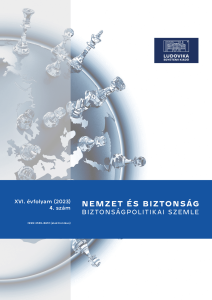„Baráti tűz” Közép- és Kelet-Európára – Hogyan működik az orosz gázfegyver a nyugati szövetségi rendszer perifériáin?
Deák András – Szabó John – Weiner Csaba
Nemzet és Biztonság – Biztonságpolitikai Szemle
16. ÉVFOLYAM, 4. SZÁM | 2023
Megjelent: 2024-07-10
Oroszország 2022. februári ukrajnai inváziója óta drámaian visszaestek az Európába irányuló orosz gázszállítások. Tanulmányunk azzal foglalkozik, hogy Oroszország hogyan szankcionálta a gázfegyver bevetésével a háború előtt még viszonylag orosz-barát politikát folytató közép- és kelet-, illetve dél-európai államokat, és utóbbiak miként reagáltak erre. Oroszország szándéka az volt, hogy a célország minimalizálja a hozzájárulását Ukrajna honvédő erőfeszítéseihez és a nyugati szankciókhoz, illetve hogy tartsa fenn az együttműködést Oroszországgal. Magyarország, Bulgária és Szerbia esetének segítségével, valamint az N. C. Crawford és A. Klotz 1999-esírásában ismertetett négy befolyásolási modell – kényszerítés, normatív kommunikáció, erőforrás-megtagadás és politikai törés – alkalmazásával mutatjuk be, hogy milyen különbözően működnek a szankciók eltérő társadalmi-politikai kontextusban. Habár egyik eset sem kínál vegytiszta példát, a domináns jegyek alapján mind-egyik ország egy-egy modellt képvisel – Magyarország a normatív kommunikációt, Szerbia az erőforrás-megtagadást, Bulgária pedig a politikai törést –, míg az úgy-nevezett kényszerítés minden országban megjelent. A célország főbb vonatkozó ismérvei – bel- és külpolitika, energiapolitika, az energiarendszerek jellemzői – közül az állam behatolása a társadalomba különösen fontos szerepet játszott a szankciók kialakításában és hatásában, illetve a szankcionáltak válaszlépéseiben.
Kulcsszavak: szankciók, földgáz, Oroszország, Közép- és Kelet-Európa
‘Friendly Fire’ on Central and Eastern Europe: How the Russian Gas Weapon Works on the Peripheries of the Western Alliance
András Deák – John Szabó – Csaba Weiner
Russia deployed its “gas weapon” to coerce European states into supporting its political agenda following its February 2022 invasion of Ukraine. This paper explores the Kremlin’s intentions and the responses of Central and East European countries with relatively pro-Russian politics prior to the war. Russia aimed to minimise the target country’s contribution to Ukraine’s war efforts and support of Western sanctions, while nudging them to maintain cooperation. The form and impact of Russia’s actions differed based on the socio-political contexts, which we illustrate with three case studies: Hungary, Bulgaria, and Serbia. Findings are theorised with the use of N.C. Crawford and A. Klotz’s 1999 analytical framework identifying four models of influence – compellance, normative communication, resource denial, and political fracture. Cases are not clear-cut, but broadly speaking each falls into one of three categories – Hungary into the normative communication, Serbia into the resource denial, and Bulgaria into the political fracture – based on predominant patterns, while compellance is perceivable in each country. Domestic and international policy, energy politics, and the characteristics of energy systems in the target countries all shape sanction design in addition to which the dominant political leadership’s penetration of domestic society is especially pertinent in shaping the sanction design, its effect, and the responses of the receiver of the sanctions.
Keywords: sanctions, natural gas, Russia, Central and Eastern Europe.



